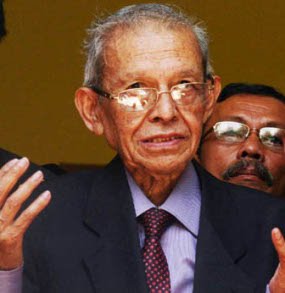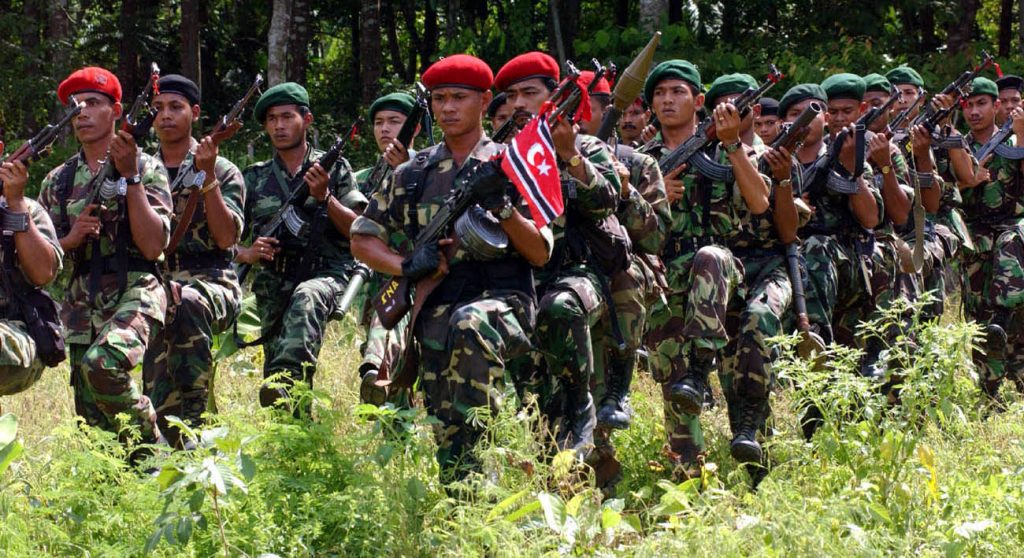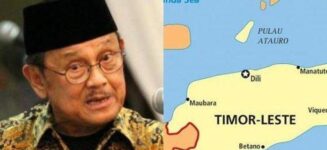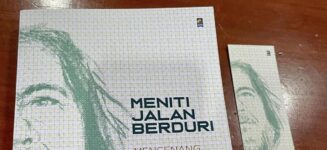The article was published in The Jakarta Post Dec. 5, 2003 http://www.preventgenocide.org/prevent/news-monitor/2003dec.htm
Decades of war, abuse and injustice have turned Aceh into an awakened province, yet trapped again in war. Alas Jakarta missed its best chances of a peaceful solution even before the failure of last year’s peace process.
In 1989, in The Hague, Free Aceh Movement (GAM) leader Hasan Mohammad di Tiro showed this writer pictures in a Libyan magazine of young Acehnese doing a military exercise, whom it turns out are to be among the rebel generation returning home that year and now active in Aceh.

Asked in 1995 how he thought he would achieve his aim, the Sweden-based rebel replied: “dengan jalan apa saja (by any means)!” In his view, “Aceh has been robbed by the Javanese, using a mask called Indonesia. It’s an aggression, Javanese versus Acehnese. I pin much hope on myself and on my countrymen, the nation of Aceh-Sumatra!”
The claim may be false, but that hope became, to an important degree, true, as Aceh entered its Glasnost (opening up) in 1998 with the emergence of a dynamic civic movement, distinct from, but sharing local concerns with GAM. Villagers, who hated the rebels in the 1970s and were hurt and humiliated during the military operation called DOM, 1989-1998, turned to GAM and the students.
The Army’s brutality had shaped a symbol of legitimacy in the image of GAM among many villagers that it enabled the rebels to behave like what one historian of Aceh, Anthony Reid, recently called “a government in waiting”.
But GAM was not exactly a popular movement like East Timor’s Fretilin. It extorted local business and drew resources from expatriates, yet enjoyed rural support, sources said. Jakarta’s failure to break this strength may have been the main reason for the failure of last year’s peace process.
That predicament may influence the course of GAM if the idea of independence and the existence of armed rebels continue to provide alternative symbol, hope and security as they did in the 1980s. Both the Army and GAM may have been involved in widespread abuses, but the rebels apparently accommodated grievances and addressed needs in the way Jakarta and Aceh’s local administration never did.
The gap was obvious, but became crucial in the late-1990s. Bondan Gunawan, a former minister in President Abdurrachman Wahid’s administration who met with GAM commander the late Abdullah Syafi’ie in March 2000, noted that Syafi’Ie was “a man we can do business with.”
They urged all sides to halt violence. As Bondan called for strengthening Aceh while staying with the republic, Syafi’ie reportedly insisted on having a tete-?-tete in his car and whispered “prove first that Jakarta can be trusted so that Aceh can live safely.”
In 1948 Acehnese leader Daud Beureu’eh took a similar attitude when he demanded a written statement, but reluctantly accepted President Sukarno’s oral promise to keep Aceh’s Islamic identity. Acehnese leaders seemed willing to give Jakarta the benefit of the doubt only by unmistakably insisting that Jakarta should be firm and credible before Aceh can live peacefully.
So how trustworthy has Jakarta been to Aceh since the late-1990s? If Sukarno broke his promise and provoked Beureu’eh into rebellion, Bondan and Syafi’ie felt they had contributed to the dialog, leading to the “Humanitarian Pause” agreed in May 2000.
But GAM’s continuing influence, with an alternative rural “government” in some districts, must have become so unbearable for Jakarta that an all-out confrontation seemed inevitable.
Neither side had since been able to realize the hope that “Aceh can live safely.” Even the short-lived peace early this year, fully supported at home and internationally, was subsequently undermined by GAM’s pro-independence campaign and disrupted by the militia-backed local actions in Takengon and Langsa.
Peace will only last with greater justice. In Aceh, it has failed basically because from the outset, i.e. amid hopes for true reformasi since 1998, peace for Aceh implied justice for victims of human rights abuses — a principal demand the civil society crucially shared with villagers.
While President B.J. Habibie offered an apology, terminated the DOM and reduced the military strength, and President Wahid refused to impose martial law, resisted the attempts to reinstall Aceh’s military command and started a dialog with GAM, neither had brought a single figure responsible for abuses to justice.
When a parliamentary committee in Jakarta in the late-1999 questioned five former top generals and a former Aceh governor — all were widely resented for allegedly responsible for past atrocities and the TV live broadcast widely watched — expectations rose high in Aceh, but were soon dashed as the issues went nowhere.
Had Jakarta taken these issues seriously, it might gain support from the civil society and local elite. “We could have bridged the pro and anti-independence camps,” argued activists like Rausan Fikri.
Instead, the golden chances to restore Aceh’s trust and save it from war, were lost during Aceh’s most crucial period, 1998-2001. The Army’s dissatisfaction grew as its prestige declined and local officers saw the pro-human rights climate as restricting actions against rebels. Wahid admitted, by April 2001, he was put under pressure to sign the decree to implement a military operation in Aceh.
With Megawati Soekarnoputri’s presidency came a full-blown war, with the martial law being extended without evaluation, i.e. without clear victory. Guerrilla war in Aceh, as in Vietnam and now Iraq (although legally Aceh is a domestic case), has been increasingly decentralized and forced the Army to disperse small fighting units.
Will this allow the martial law authority to secure public security and trust in just six months to ensure free elections?
East Timor, another war torn area in 1999, went to vote despite fearing the insecurity, because they had great hope and trusted the balloting (by the UN), but how much hope and trust will the Acehnese have?
With Aceh, or greater sections of it, alienated, left with fear and distress by the war, impoverished and losing its democratic space under the martial law, the general elections in 2004 may add another common experience for the Acehnese, unique and radically different from elsewhere in Indonesia.
Quite unintentionally — as many now worry — the war may have shaped the embryo of a separate nation.



